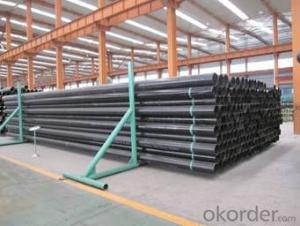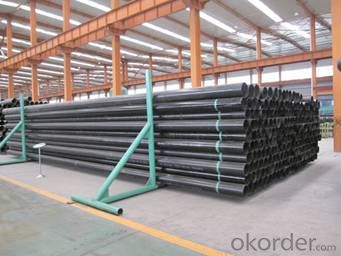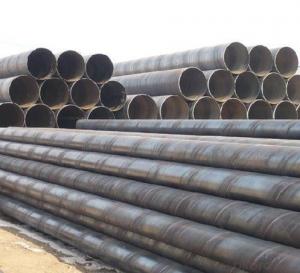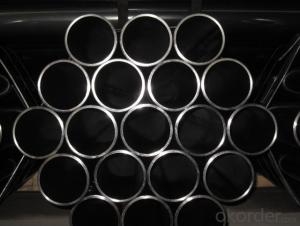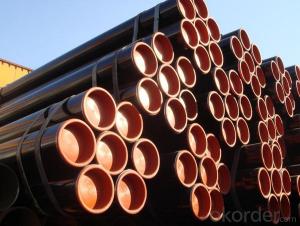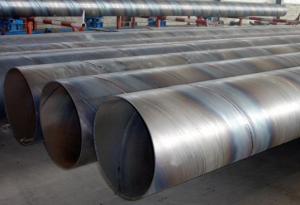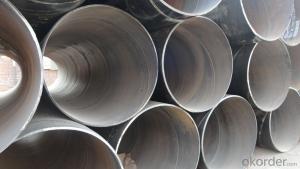ERW casing
- Loading Port:
- China Main Port
- Payment Terms:
- TT OR LC
- Min Order Qty:
- -
- Supply Capability:
- -
OKorder Service Pledge
OKorder Financial Service
You Might Also Like
OD(Inch) | 5 | 5 1/2 | 6 5/8 | 7 | 8 5/8 | 9 5/8 | 10 3/4 | 13 3/8 | 16 | 20 |
|
|
| ||||||||
Thickness(mm) | 5 | 6 | 7 | 8 | 9 | 10 | 11 | 12 | 13 | 14 | 15 | 16 | |||||||||
Grade | J55 | K55 | N80 | N80Q | L80 | P110 |
|
|
|
|
|
| |||||||||
standar d | API 5CT | ||||||||||||||||||||
Ends | Plain ends, cutting, threading, beveled, flange, etc | ||
Packing | Packing in bundle with steel strips; with seaworthy package at the end; could be done with your requirement. | ||
Certification | BV, IAF, SGS,COC, ISO or as per customer | ||
Inspection | With Chemical Composition and Mechanical Properties Testing; Hydrostatic Test, Dimensional and Visual Inspection, Also With Nondestructive Inspection | ||
Application | Urban construction pipe, machine structure pipe, agriculture equipment pipe, water and gas pipe, Greenhouse pipe, Building material tube, Low pressure fluid tube, Oil Industry pipe, etc | ||
Trade Terms | FOB, CFR, CIF, EXW, etc. | ||
Payment Terms | L/C, D/A, D/P, T/P Western Union, MoneyGram acceptable, T/T preferred | ||
Delivery Time | Usually within 10-30 days after receipt of deposit, ASAP | ||
Loading Port | Xingang , Tianjin | ||
Original Place | Shandong, China | ||
- Q: What are the non-destructive testing methods used for steel pipes?
- Some of the non-destructive testing methods used for steel pipes include ultrasonic testing, magnetic particle testing, liquid penetrant testing, radiographic testing, and eddy current testing.
- Q: How do you repair damaged steel pipes?
- To repair damaged steel pipes, the first step is to assess the extent of the damage. If it's a small crack or hole, it can be fixed using a steel-filled epoxy or a pipe repair clamp. However, for more significant damage, such as extensive corrosion or a large rupture, cutting out the damaged section and replacing it with a new pipe is usually necessary. In some cases, professional welding or soldering may be required to ensure a secure and leak-proof repair.
- Q: How does the price of steel pipes vary based on market demand?
- The price of steel pipes can vary based on market demand as it follows the basic economic principle of supply and demand. When the demand for steel pipes is high and the supply is limited, the price tends to increase. Conversely, when the demand is low and there is excess supply, the price tends to decrease. Factors such as infrastructure projects, industrial growth, and construction activities heavily influence the demand for steel pipes, thus impacting their price in the market.
- Q: Are steel pipes suitable for use in pharmaceutical industries?
- Yes, steel pipes are suitable for use in pharmaceutical industries. Steel pipes are known for their durability, strength, and resistance to corrosion. These qualities make them ideal for transporting chemicals, gases, and liquids safely and efficiently within pharmaceutical facilities. Additionally, steel pipes can be easily cleaned and sanitized, ensuring the maintenance of high hygienic standards required in the pharmaceutical industry.
- Q: What are the applications of galvanized steel pipes?
- Galvanized steel pipes have a wide range of applications across various industries. They are commonly used in plumbing systems for water supply and drainage systems due to their corrosion resistance and durability. Additionally, they are used in the construction industry for structural supports, scaffolding, and fencing. Galvanized steel pipes are also widely utilized in agricultural irrigation systems and in the transportation of liquids and gases.
- Q: Can steel pipes be used for underground drainage in acidic soils?
- Steel pipes can be used for underground drainage in acidic soils, but it is important to consider certain factors. Acidic soils can cause corrosion in steel pipes, leading to weakening and potential failure over time. To mitigate this risk, it is advisable to use galvanized steel pipes that are treated with a protective coating to resist corrosion. Additionally, regular inspection and maintenance should be carried out to identify and address any signs of corrosion or deterioration. It is also worth considering alternative materials such as PVC or HDPE pipes, which are more resistant to corrosion in acidic environments. Ultimately, the choice of material should be based on a thorough assessment of the soil conditions, the expected lifespan of the drainage system, and the budgetary constraints.
- Q: What are the different standards for steel pipe manufacturing?
- There are several different standards for steel pipe manufacturing, including ASTM (American Society for Testing and Materials), ASME (American Society of Mechanical Engineers), API (American Petroleum Institute), and DIN (Deutsches Institut für Normung). These standards provide specifications for various aspects of steel pipe production, such as dimensions, chemical composition, mechanical properties, and testing procedures. Compliance with these standards ensures the quality and reliability of steel pipes for different applications and industries.
- Q: How are steel pipes used in the construction of oil refineries?
- Steel pipes are extensively used in the construction of oil refineries as they are strong, durable, and resistant to corrosion. These pipes are used for various purposes such as transporting crude oil, refined products, and various chemicals within the refinery. They are also utilized in the construction of the refinery's infrastructure, including the fabrication of storage tanks, process equipment, and piping systems that connect different units and sections of the facility. Overall, steel pipes play a crucial role in maintaining the integrity and efficiency of oil refineries.
- Q: How are steel pipes joined together?
- Steel pipes are typically joined together using various methods such as welding, threading, and flanging. Welding involves melting the ends of the pipes and fusing them together, creating a seamless connection. Threading involves cutting screw-like grooves on the pipe ends, which are then screwed tightly together using a threaded coupling. Flanging involves adding a flange, a flat plate with holes, to each pipe end, and then bolting them together securely. These joining techniques ensure strong and durable connections between steel pipes.
- Q: Can steel pipes be used for the construction of dams?
- Yes, steel pipes can be used for the construction of dams. Steel pipes are often used in dam construction for various purposes such as water intake and outlet structures, penstocks, and spillway gates. They offer durability, strength, and resistance to corrosion, making them suitable for withstanding the high pressures and harsh environments associated with dam construction.
Send your message to us
ERW casing
- Loading Port:
- China Main Port
- Payment Terms:
- TT OR LC
- Min Order Qty:
- -
- Supply Capability:
- -
OKorder Service Pledge
OKorder Financial Service
Similar products
Hot products
Hot Searches
Related keywords
